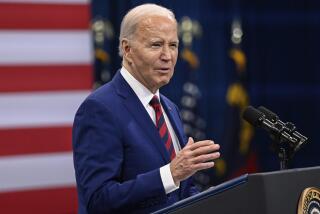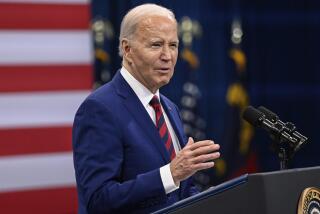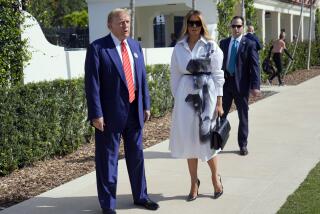Clinton Pounds Brown in W.Va., Nebraska : Politics: Primary victories boost Democratic front-runner’s momentum toward nomination. Bush trounces Buchanan in both states.
Arkansas Gov. Bill Clinton continued his methodical march toward the Democratic presidential nomination Tuesday, crushing former California Gov. Edmund G. (Jerry) Brown Jr. in low-key primaries in West Virginia and Nebraska.
President Bush, who has already clinched renomination, also rang up easy victories in both states over conservative columnist Patrick J. Buchanan.
With 76% of the vote counted in West Virginia, Clinton led Brown 74% to 12%; the Arkansas governor held a 47%-23% lead in Nebraska with about 79% of the vote in. The uncommitted slate drew 17%.
Though former Massachusetts Sen. Paul E. Tsongas has suspended his campaign, he remained on the ballot in both states and was attracting 8% of the Nebraska vote and 7% in West Virginia.
On the Republican side, Bush led Buchanan in West Virginia 80% to 15% with 75% of the vote in; the President held an 84%-14% advantage with 84% counted in Nebraska.
Bush went into the day’s voting with 1,230 delegates, well above the 1,105 needed for a first-round nomination at the GOP convention in August. At stake in Tuesday’s GOP voting were 24 delegates in Nebraska and 18 in West Virginia.
Clinton, meanwhile, began Tuesday with 1,738 delegates--81% of the 2,145 needed for a first-ballot nomination. For the Democrats, 31 delegates were at stake in West Virginia and 25 in Nebraska.
With 740 pledged delegates still to be chosen in the eight remaining contests after Tuesday’s voting, it now appears virtually certain that Clinton will go over the top on June 2, when California, Ohio, New Jersey, Alabama, Montana and New Mexico hold contests.
Speaking with reporters Tuesday night in Minneapolis, Clinton said he was “very encouraged” by his two new victories. Clinton had spent the day campaigning in Minnesota, where he held a rally and met with uncommitted delegates.
Brown, already campaigning in Ohio, conceded that he was disappointed with Tuesday’s primary results, particularly West Virginia. “Obviously they were not as good as I would have liked,” Brown said.
Brown all but conceded he has no chance to win the nomination but said he would not drop out of the race even if he fails to break into double digits in the remaining primaries. “We are fighting a powerful opposition,” he said, “but the cause is right. . . . The longer we stay in this campaign, the more Bill Clinton adopts the things we are talking about. The longer we keep pushing, the more we may be able to turn this country around.”
The day’s most spirited contest came in West Virginia, where Democratic Gov. Gaston Caperton appeared headed for victory against state Sen. Charlotte Pritt and Atty. Gen. Mario J. Palumbo. Caperton has suffered through a turbulent first term marked by political and personal controversy ranging from an unpopular tax increase to a bitter divorce from his wife.
With 76% of the precincts counted, Caperton led with 42%, compared to 34% for Pritt and 21% for Palumbo. Two other candidates split the remainder.
On the Republican side, Agriculture Commissioner Cleve Benedict easily defeated former state legislator A. V. Criss.
In the West Virginia Democratic primary for attorney general, former state Supreme Court Justice Darrell McGraw defeated attorney Ed ReBrook, who sued a television station Monday after it broadcast charges from several women accusing him of sexual harassment.
Also in West Virginia, a Democratic primary pit Rep. Alan B. Mollohan against fellow Rep. Harley O. Staggers Jr. after the state lost a seat to redistricting; Mollohan was headed toward an easy win, with about two-thirds of the vote counted.
In both West Virginia and Nebraska, the presidential contests drew little attention--from the candidates or voters. Their primaries were eclipsed by the Los Angeles riots, which dominated news coverage and drew visits to the city last week from Bush, Buchanan, Clinton and Brown.
Only Brown devoted much time to campaigning in either state; Bush and Buchanan skipped them both entirely. Clinton made only a brief stop in Nebraska last Sunday and devoted just one full day to West Virginia, where he had been endorsed by Sen. John D. (Jay) Rockefeller IV. Nebraska Sen. Bob Kerrey, who dropped out of the Democratic race in March, did not publicly endorse either of his former rivals.
Bush’s two victories kept his perfect record intact: He has now defeated Buchanan in each of the 29 Republican contests.
With Tuesday’s victories, Clinton has now defeated Brown in 12 consecutive contests. Brown last bested Clinton in the Alaska caucus on April 2--though both trailed an uncommitted slate. Since then, Clinton has rolled up victories in New York, Wisconsin, Kansas, Minnesota, Virginia, Pennsylvania, Guam, the District of Columbia, Indiana and North Carolina.
Of the remaining states on the Democratic calendar, only two appear at all encouraging for Brown. Some analysts believe that he could improve on his recent performances in environmentally sensitive Oregon, which votes next Tuesday. Clinton aides apparently think so: Though the campaign did not run television ads in either Nebraska or West Virginia, it is running a spot in Oregon that encourages viewers to call an 800 number for a copy of the Arkansas governor’s economic plan.
A survey released Tuesday by an Oregon television station showed Clinton leading Brown 37% to 20%, with 15% preferring Tsongas. Twenty-eight percent of Oregon Democrats remained undecided.
Brown, who served two terms as California’s governor, is also hoping for a strong showing in his native state.
But Brown’s poor finishes elsewhere appear to be eroding his support in California as well: A Field Institute poll released Tuesday showed Clinton leading Brown 49% to 42% among likely Democratic primary voters in California.
In a late April Los Angeles Times poll, Brown held a lead of 51% to 37%.
With the nomination virtually in hand, though, Clinton has already shifted his focus toward the general election--and Bush and potential independent candidate Ross Perot. The Democratic front-runner has ignored Brown since mid-April.
“It is now a national campaign,” said Frank Greer, Clinton’s media adviser. “I think the way you win the remaining (primary) states is by actively engaging the President. . . . It is not as if Jerry Brown is really a factor.”
Times staff writers Cathleen Decker in Minnesota and Michael Ross in Ohio contributed to this story.
More to Read
Get the L.A. Times Politics newsletter
Deeply reported insights into legislation, politics and policy from Sacramento, Washington and beyond. In your inbox three times per week.
You may occasionally receive promotional content from the Los Angeles Times.






